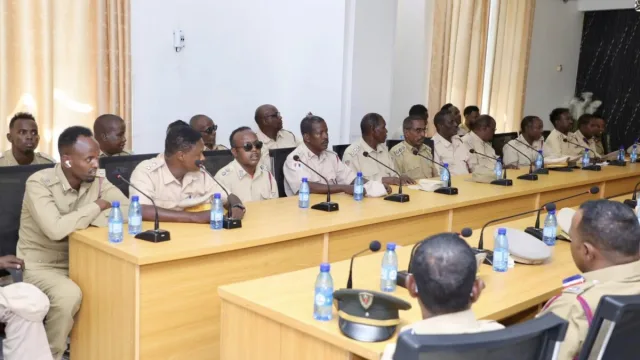Footage has recently emerged from Syria of an apparently British fighter helping execute a prisoner loyal…

Footage has recently emerged from Syria of an apparently British fighter helping execute a prisoner loyal to Syrian President Bashar al-Assad. This fighter is thought to be aligned with the Islamic State of Iraq and the Levant (ISIL), the al-Qaeda offshoot.
Unfortunately, it is no surprise that a British citizen is carrying out such an act, as Brits have been killing – and being killed – in jihadist conflict zones for decades. Worryingly, the numbers now seem to be growing, rather than diminishing.
In the 1990s, a small but steady stream fought in Chechnya, Bosnia, Kashmir and Afghanistan. Pro-Mujahideen websites highlighted cases such as Dawood al-Britanee and Abu Muslim al-Turki, killed fighting in Bosnia. In 1996, it is thought that Britain had its first – although by no means its last – suicide bomber, an individual fighting alongside the Taliban in Afghanistan. Four years later, Birmingham resident and Jaish-e-Mohammed recruit Bilal Ahmed carried out a similar attack in Kashmir.
The government’s response was close to non-existent. Terrorist recruitment and facilitation centres were allowed to operate virtually unhindered. One recruit estimated that around 50 Muslims were killed fighting abroad from one London mosque alone.
A ‘pure’ Islamic state
The situation was exacerbated by 9/11 and the subsequent war in Afghanistan. Dozens more British Muslims travelled with the purpose of defending the Taliban, joining fellow countrymen who had already emigrated there to experience living in a “pure” Islamic state. British troops were now at war with some of their fellow countrymen – a problem that continued throughout the war.
Belatedly, the government began to grasp the scale of the problem it had allowed to take root. However, as anti-Western sentiment spread after 9/11, so did the presence of British fighters. Asif Hanif, a London resident, killed three people in a suicide attack in a bar in Tel Aviv in 2003. By 2006, it was feared that up to 150 Brits had journeyed to Iraq to combat US and UK forces under the guidance of Abu Musab al-Zarqawi, then head of al-Qaeda in Iraq.
This trend was not restricted to countries that were close allies of the West or had been subject to a US-led intervention. For example, in 2007, a London resident killed over 20 Somali soldiers in a suicide attack in Mogadishu. Somalia itself was to become an increasing magnet for British citizens, with over 100 receiving training there by 2009, and the number now likely to be much higher. As al-Qaeda in the Arabian Peninsula gained strength in Yemen, it, too, would attract dozens of British volunteers.
Now the conflict has spread to Syria, where security officials claim that the numbers of Brits travelling are higher than Iraq and Afghanistan combined. As of December 2013, researchers at the International Centre for the Study of Radicalisation assessed the number that had fought there could be as high as 366. These ranks were reduced by one in February 2014 when Abdul Waheed Majid carried out a suicide truck bombing in Aleppo.
Battle-hardened returnees
There are understandable fears over the activities of radicalised, battle-hardened returnees from the Syrian jihad. However, there are no guarantees that they will automatically involve themselves in terrorism-related activity back home. Only 28 percent of those who have committed “Islamist”-related offences since 1999 had received any known terrorist training, and only 4 percent had fought in foreign conflict zones. While these numbers may be reassuring, sheer weight of numbers means returning fighters will likely plan terrorist acts against domestic targets. The threat is clearly significant.
The British government has responded. The Home Secretary stripped several dual-nationals of their citizenship in an attempt to prevent their return from Syria and, last month, the police appealed to Muslim women to try and persuade their relatives not to travel there. The police have also been much more active in prosecuting those returning from Syria than it has been with past conflicts.
Dozens have already been charged – including former Guantanamo Bay detainee Moazzam Begg – though the ease with which the state can assemble usable evidence regarding alleged offences in a warzone remains to be seen. When prosecution is not possible, placing returnees through de-radicalisation programmes will be a likely alternative.
Yet the war in Syria will continue to attract Brits. Some will travel because they sympathise with al-Qaeda’s ideology, others because they genuinely wish to alleviate Muslim suffering and who have no intention of joining up with al-Qaeda or ISIL. Unfortunately, the radicalising effect of conflict means this could sometimes be the outcome anyway.
Ultimately, as long as there are images of Muslim suffering worldwide, groups like al-Qaeda will manipulate it to inspire Westerners to join their cause. Governments can implement practical measures to control this. Yet as violence flourishes across the Middle East and Africa, the limits of what they can do to stop it entirely are becoming alarmingly clear.
Robin Simcox is a Research Fellow at the Henry Jackson Society and an expert on terrorism, al-Qaeda and its affiliate groups, and national security.
This article originally appeared on Aljazeera.





